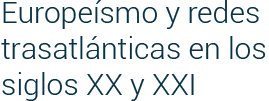
This research area includes three activities: analysing the institutionalisation process of cultural Europeanism and the decisive role played by transatlantic networks in the context of the cultural Cold War; analysing the debate on education which took place in the different organisations which emerged in the inter-war period, during the European construction process and in the postwar, by delving into the importance of transatlantic networks; analysing the presence of European culture and common values in current compulsory education syllabi as well as the students’ opinions on these issues.
The institutionalisation process of cultural Europeanism (1940-1960)
Our aim is to explain the most important stages of the institutionalisation process of cultural Europeanism and its interrelations with the context of the cultural Cold War and with transatlantic networks, as well as to reflect on its role in the European construction process.
Investigator-in-charge
Luis Domínguez Castro
Researchers
- Valladolid: Ricardo Martín de la Guardia, Guillermo Pérez Sánchez, Víctor Gavín
- Vigo: José Ramón Rodríguez Lago, Luis Domínguez Castro, Santiago de Navascués Martínez
Results of research
Debate on education in the international organisations of the inter-war and post-war periods (1924-1960)
The International Institute of Intellectual Cooperation (IIIC) and the Conference of Allied Ministers of Education (CAME) set a clear precedent for UNESCO, which has always been trying to ensure that school plays a key role in the establishment of a new international order based on cooperation and mutual understanding. As for the Council of Europe and the European Movement, they also worked actively on education issues, with a special emphasis on the role played by education in the creation of a European spirit in all the Member States through all kinds of initiatives, including a series of congresses and conferences, as well as a handbook of civil education to be distributed in primary and secondary education centres. The analysis of a number of documents related to these issues will enable us to find out what progress has been made as well as to determine the connection between these efforts and the various national strategies adopted in the field of education.
Investigator-in-charge
Luis Domínguez Castro
Researchers
- Valladolid: Ricardo Martín de la Guardia, Guillermo Pérez Sánchez, Víctor Gavín
- Vigo: Luis Domínguez Castro, Natalia Núñez Bargueño, María Isabel Doval Ruíz y María Ainhoa Zabalza
Results of research
European culture and values in current school syllabi
School plays a significant role when it comes to the cultural and political socialisation of the generations that are destined to guarantee a culture of peace and European common values. The Eurobarometer’s most recent data reveal that citizens aged 15 to 24 feel more attached to European values than the rest, even in countries such as Italy, where a strong feeling of detachment has been noticed in the last few years. The fact that our research team includes two teachers who are specialised in the fields of education and school management will enable us to verify to what extent European culture and values are present in the current school syllabi, not only in Spain but also in other European countries.
Investigator-in-charge
María Ainhoa Zabalza
Researchers
- Valladolid: Ricardo Martín de la Guardia, José Carlos Tenorio Macia
- Vigo: José Ramón Rodríguez Lago, Luis Domínguez Castro, María Isabel Doval Ruíz y María Ainhoa Zabalza Cerdeiriña
Results of research
